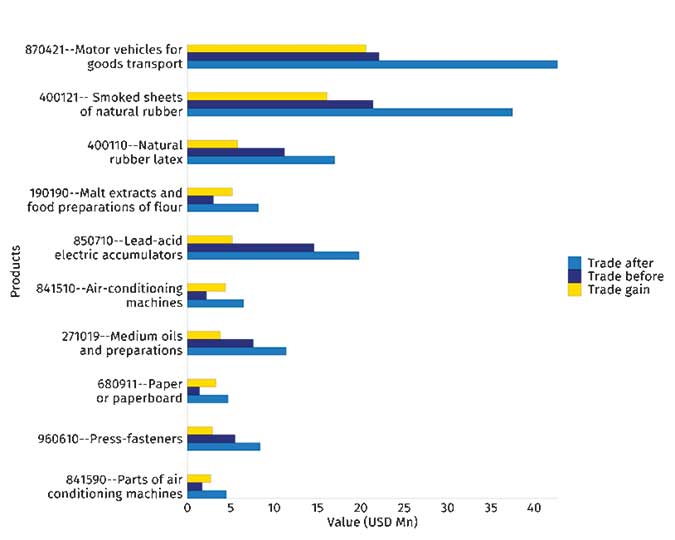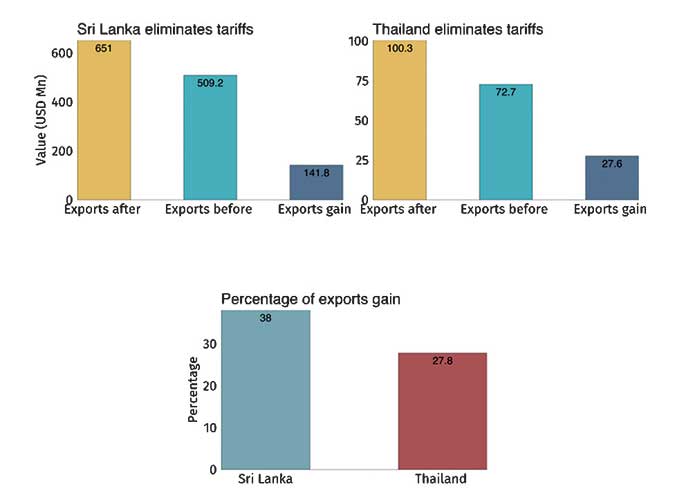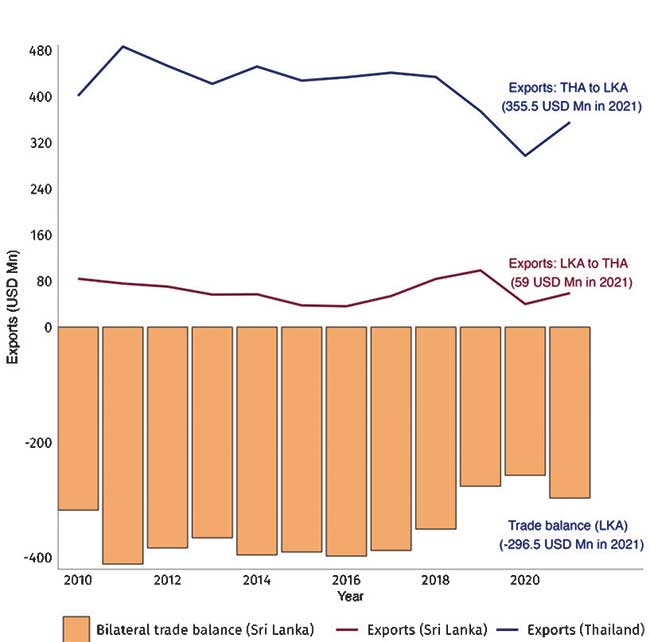Business
Overcoming Obstacles: The Economic Case for a Sri Lanka-Thailand FTA
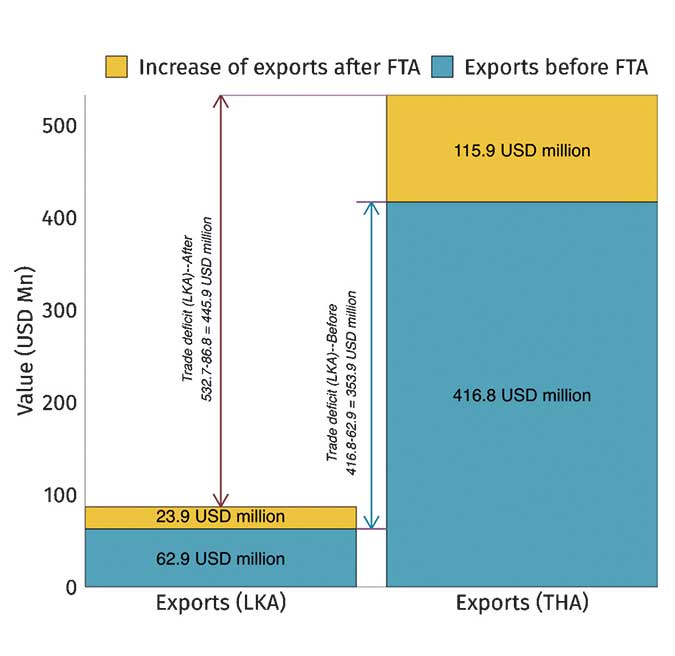
By Asanka Wijesinghe and Nilupulee Rathnayake
In 2019, only 6 % of tea imported by Thailand was from Sri Lanka. This low percentage can be attributed to the difference in preferences and Thailand’s high tariffs of 90 % on imported tea, which act as barriers to Sri Lanka’s tea exports. Additionally, Thailand imposes up to 30 % tariffs on nearly 120 product lines of wearing apparel.
These high tariffs for products with a comparative advantage are not exclusive to Sri Lanka. Thailand also faces higher tariffs for vehicles, rubber, and light-electronics exports which Thailand exports competitively. This tariff structure hampers the bilateral trade of products with a higher comparative advantage for both countries.
Despite these challenges, Sri Lanka and Thailand have expedited the process of signing a free trade agreement (FTA) to boost bilateral trade by threefold to USD 1.5 billion. This article discusses the trade effect of an FTA and a way forward to maximise the gains from an FTA.
Existing Trade is Skewed towards Thailand
In the pre-pandemic period, Sri Lanka-Thailand bilateral trade was nearly USD 500 million. The three-year-2017, 2018 and 2019- average exports from Sri Lanka to Thailand were USD 62.9 million, while the exports from Thailand to Sri Lanka were USD 416.8 million. In 2019, Thailand was the 9th largest import source for Sri Lanka, but Sri Lanka is only the 73rd largest import source for Thailand. The mismatch resulted in a bilateral trade deficit of USD 353.9 million.
The existing exports from Sri Lanka to Thailand do not represent Sri Lanka’s typical export basket. The contribution of traditional exports like ready-made garments, tea, rubber, and coconuts is relatively low, and gems, electrical equipment, wheat flour, and activated carbon contribute to a greater extent. Technically specified natural rubber and latex are the top exports from Thailand which are essential raw materials in the value-added rubber industry of Sri Lanka.
Effect of Lowering Tariffs on Bilateral Trade to Zero
As estimated from partial equilibrium analysis, Sri Lanka will realise a 38 % increase in exports to Thailand if tariffs are reduced to zero (Figure 2). The wearing apparel sector would be the biggest beneficiary, with exports projected to increase by 251 % from USD 6.4 million to USD 22.5 million. Figure 3A provides the top ten exports by Sri Lanka benefitting from a tariff removal by Thailand. The export effect for Thailand will be 27.8 % and Thailand’s rubber and plastic products will be increased by 71.9 % or USD 35.4 million. Products such as smoked sheets of rubber and natural latexwould benefit the most from tariff elimination, as shown in Figure 3B.
Assuming an immediate phasing-out of the existing tariffs, an FTA would increase bilateral trade to USD 619.6 million by 29.1 %. This increase falls short of the ambitious goal of a threefold increase in bilateral trade, at least in the short run.
However, partial equilibrium analysis does not estimate the trade gains from new product innovations due to FDI movements. The estimates also do not account for trade effects through input-output linkages and magnification of tariff effects along the value chains. However, tariff phasing out takes time, and FTA coverages are less than 100 %.
An offensive list contains products for which a country has a comparative advantage, capacity for expansion, and a favourable tariff from the importing country. There are 154 such products for Sri Lanka. Notably, 81 % of the USD 27.6 million export gain from an FTA comes from these 154 product lines. Similarly, 69 % of Thailand’s export gains to Sri Lanka in an FTA comes from 147 products identified for the offensive list.
Once ordered by the estimated export gains, nine out of the top ten products of Sri Lanka’s offensive list are from the wearing apparel sector. For Thailand, vital offensive products are rubber, electric equipment like air-conditioners and refrigerators, and motor vehicles for goods transportation.
Challenges and the Way Forward:
Applying tariff cuts for all the products in the offensive lists is a challenge. Thailand’s high tariffs for tea and ready-made exports indicate its protectionist intent. Likewise, Sri Lanka might prefer to keep tariffs on rubber products. Significant political manoeuvring and delicate negotiations will be required to bring the coverage of the FTA to a satisfactory level. Secondly, an FTA will widen Sri Lanka’s trade deficit with Thailand by 26 % (Figure 4). Although a trade deficit is not necessarily detrimental, it does present a short-term challenge due to increased dollar outflow.
A possible solution is tariff elimination for the products in bilateral value chains. Sri Lanka uses Thailand’s rubber and textile products to produce finished goods. If Thailand removes tariffs for these finished products, increased exports will demand more raw materials. Sri Lanka can reciprocate by eliminating tariffs on raw materials. Phasing-in of the FTA, accounting for required adjustments, will also increase the political feasibility.
Strengthening bilateral trade ties with Thailand offers additional benefits to Sri Lanka. An FTA provides an opportunity to join electric equipment manufacturing value chains and a gateway to ASEAN economies. Thus, Sri Lanka should negotiate a comprehensive trade agreement with investment promotion, trade facilitation, and competition laws. Thailand can leverage Sri Lanka’s position as a distributional hub for regional exports.
Link to Talking Economics blog:
https://www.ips.lk/talkingeconomics/2023/05/11/overcoming-obstacles-the-economic-case-for-a-sri-lanka-thailand-fta/
Business
Lanka’s largest solar park set to transform energy landscape and local economy in Hambantota
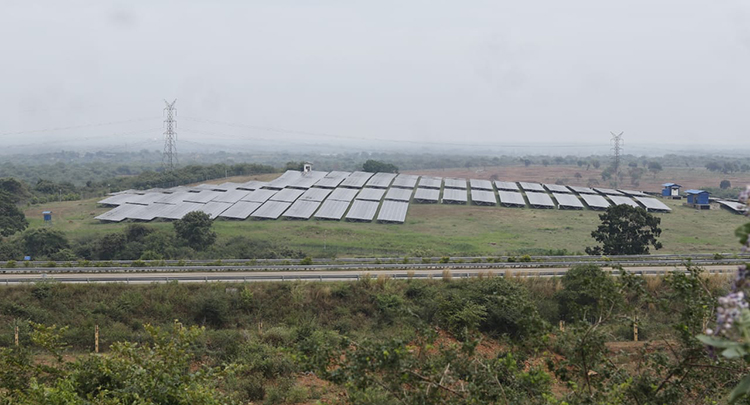
A new era in Sri Lanka’s renewable energy is unfolding in the Gonnoruwa Division of Hambantota District, where construction has begun on the country’s largest solar power park. Spanning 450 acres and designed to generate 150 megawatts (MW) of electricity, the US$150 million private-sector-led project is poised to become a cornerstone of the nation’s sustainable energy ambitions.
Officials say the solar park, guided by the Sustainable Energy Authority and the Mahaweli Authority, will make its first contribution to the national grid by the end of this year, with full capacity expected by 2026. Once completed, the facility will rank among Sri Lanka’s largest renewable energy installations, second only to the 210 MW Victoria Dam and the 150 MW Upper Kotmale hydropower project.
The initiative is being framed as a strategic response to recurring power cuts in the Southern Province during annual drought periods. With a projected 20% contribution to the country’s daytime electricity demand, the solar park is expected to significantly stabilize the grid, reduce reliance on fossil fuels, and contribute to the country’s renewable energy targets.
Project Engineer Thilanka Bandara confirmed that preliminary land preparation and boundary works have been completed, with 50 MW already feeding into the national grid. The investment, fully funded through foreign direct investment, local bank loans, and equity capital, requires no government funding. Two private firms are sharing the development, contributing 70 MW and 80 MW respectively.
Bandara highlighted a unique feature of the project: the transmission infrastructure, estimated at US$16 million, is entirely financed by the investors, marking a departure from conventional grid-connected projects. The park will also employ state-of-the-art ground-mounted solar technology, considered the most advanced currently deployed in Sri Lanka.
In a first for Sri Lanka, the solar panels will be installed five feet above the ground, allowing partial-shade crops to be cultivated underneath. Technical Officer Sithmina Bandara explained that this setup will enable the cultivation of food plants such as mushrooms, which thrive in shaded conditions, creating a model for integrated solar-agriculture systems. Agricultural experts have already provided guidance on implementing this initiative, which combines energy production with local food security.
The project is expected to generate 750 to 1,000 direct and indirect jobs, with 400–500 already employed in the initial phase. Long-term maintenance work will provide further employment opportunities, offering a substantial economic boost to the Hambantota region. Environmental management measures are also in place to prevent elephants from entering nearby villages, ensuring harmony between development and wildlife.
All necessary approvals and permits were obtained by February 2025, aligning the project with the Ceylon Electricity Board’s national generation plan. Officials confirmed that upon completion, the total output of the Solar Energy Park will rise to 200 MW, combining existing installations with the new 150 MW facility.
Experts say the Hambantota solar park represents more than just a power generation project. Its innovative design, private-sector financing, and integrated agricultural approach position it as a template for future renewable energy projects in Sri Lanka, reflecting a new model of sustainable development that balances energy, economy, and environment.
By Sirimanta Ratnasekera
Business
ESU Kandy clinches dominant victory at ‘Battle of Esoftians’
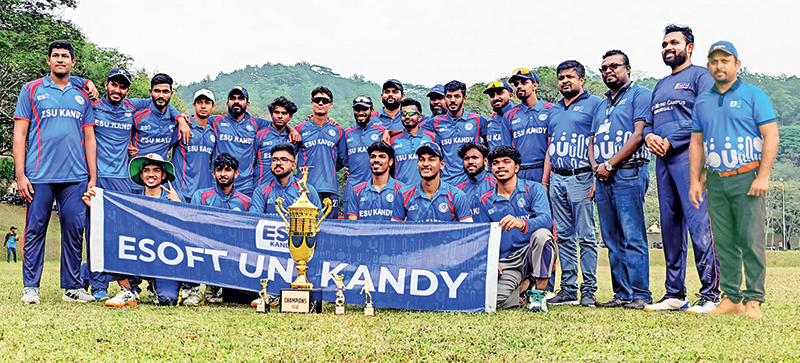
The Battle of Esoftians, an annual cricket encounter organized by ESOFT Uni Kandy, concluded with a spectacular display of cricketing prowess as the Kandy team secured a massive 245-run victory over ESOFT Metro Campus, Kurunegala. The match was held on the 15th at the University of Peradeniya Grounds.
Winning the toss and electing to bat first, the ESOFT Uni Kandy batsmen dominated the field from the outset. They showcased an explosive batting performance, posting a formidable total of 280 runs for the loss of 5 wickets in their allotted 20 overs.
In response, the Kurunegala ESOFT Metro team struggled against a disciplined bowling attack. The Kandy bowlers dismantled the opposition’s batting lineup, bowling them all out for a mere 35 runs, sealing a historic win for the Kandy campus.
The event was graced by the presence of key officials from the ESOFT management: Amila Bandara – Chief Operating Officer (ESOFT Uni), Dimuthu Thammitage – General Manager (Central Region), Lakpriya Weerasinghe – Deputy General Manager, ?Lahiru Diyalagoda
Centre Manager-Degree Division, ESOFT Metro Campus Kurunegala and Dushantha Sandaruwan – Master in Charge (ESU Kandy Cricket Club)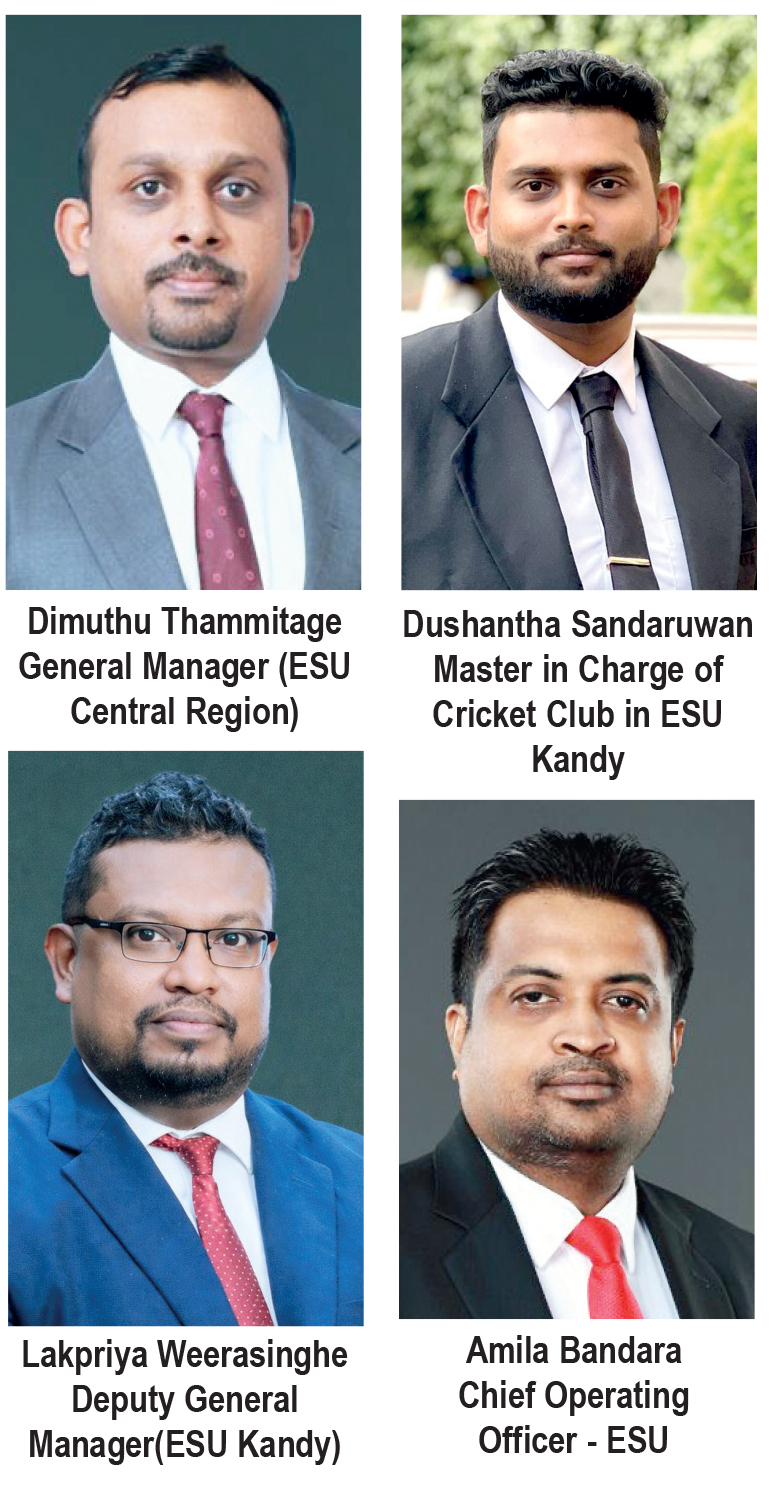
Team Lineups
ESOFT Uni Kandy (Winners)
Chamath Ekanayake (Captain), Dinuka Tennakoon (Vice Captain), Dushantha Sandaruwan (MIC), Chalitha Rathnayake, Pulasthi Bandara, Isuru Dehigama, Kesara Nuragoda, Aadhil Sherif, Isuru Pannala, Achintha Medawatta, Ahamed Shukri, Gowtham Hari Dharshan, Danushka Sahan, Eranda Bandara, and Damith Dissanayake.
ESOFT Metro Campus Kurunegala (Runners-up)
Adeesha Samarasekara, Savishan Madusha, Lahiru Diyalagoda, Hirun Damayantha, Naveen Madushanka, Daham Pothuwewa, Senuda Thewnaka, M.R. Abdulla, Arunodya Dasun, Mohamad Afri, Desith Perera, Lasitha Ranawaka, Anton Dilon, Shenuka Thirantha, and Kavindu Bandara.
Text and Pix By S.K. Samaranayake
Business
HNB joins Royal–Thomian “Battle of the Blues” as official banking partner

HNB PLC, Sri Lanka’s leading private sector bank, has joined as the Official Banking Partner for the 147th edition of the historic “Battle of the Blues,” the Royal–Thomian cricket encounter between Royal College, Colombo, and S. Thomas’ College, Mt. Lavinia. Commenting on the partnership, HNB’s Managing Director/CEO Damith Pallewatte highlighted the bank’s long-standing connection with cricket, including sponsorship of Sri Lanka’s first Test match against England in 1982, and emphasized HNB’s commitment to nurturing young talent and promoting school cricket. The three-day clash for the Rt. Hon. D. S. Senanayake Memorial Shield will take place from March 12–14 at the SSC Grounds, with the Mustangs Trophy one-day match following on March 28 under lights. HNB’s inaugural involvement marks a milestone in the bank’s sports marketing journey, strengthening its role in the school cricket ecosystem. The bank will enhance the spectator experience by introducing digital and cashless banking solutions, modernizing the event while preserving its rich heritage and sporting tradition.
-

 Features21 hours ago
Features21 hours agoWhy does the state threaten Its people with yet another anti-terror law?
-

 Business7 days ago
Business7 days agoMinistry of Brands to launch Sri Lanka’s first off-price retail destination
-

 Features21 hours ago
Features21 hours agoVictor Melder turns 90: Railwayman and bibliophile extraordinary
-

 Features21 hours ago
Features21 hours agoReconciliation, Mood of the Nation and the NPP Government
-

 Latest News2 days ago
Latest News2 days agoNew Zealand meet familiar opponents Pakistan at spin-friendly Premadasa
-

 Features21 hours ago
Features21 hours agoVictor, the Friend of the Foreign Press
-

 Latest News2 days ago
Latest News2 days agoTariffs ruling is major blow to Trump’s second-term agenda
-

 Latest News2 days ago
Latest News2 days agoECB push back at Pakistan ‘shadow-ban’ reports ahead of Hundred auction

